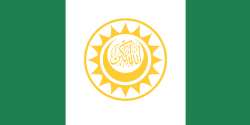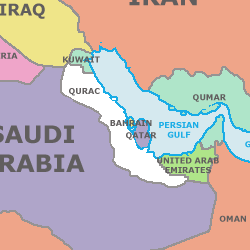Qurac
Jump to navigation
Jump to search
Return to News Files, Atlas
- Official Name: People's Union of Qurac
- Capital City: Dammam (26°26'N 50°06'E)
- Places of Interest: Al Hofuf, Al Jubail, Al Khobar, Damman, and Khafji
- Major Languages: Arabic and English
- Demonym: Quraci
- Government: Federal semi-presidential constitutional republic
- President: Hurrambi Marlo
- Prime Minister: Ahmed Heinle
- Area: 85,252 km²
- Population: 4,958,822
- Density: 58.17 km²
- Monetary Unit: Quaraci pound
- Major Resources: Crude oil production, petroleum refining, natural gas, petrochemicals, and industrial gases
- National Defence: Quraci Army, Navy, Air Force, National Guard, and Ministry of Interior Forces (paramilitary)
- International Relations: Memeber of Arab League, International Atomic Energy Agency, Islamic Development Bank, United Nations, and World Health Organisation
- Domestic Metahumans: Arabian Knight
- History: The People's Union of Qurac is located along the eastern edge of the Arabian Peninsula on the Persian Gulf. It was once part of the Ottoman Empire until Arab and British forces, under the command of Faisal I of Iraq and Field Marshal Edmund Allenby of England, overthrew the Ottomans after the First World War. Qurac became a British holding and remained so until the Second World War. Premier al-Gailiani of Iraq, an ardent Arab nationalist, replaced the moderate Iraqi government with a pro-Axis one before he was forced from power.
Hassan al-Sadr, an al-Gailiani supporter, fled south, took the name of Suleiman after the legendary Arab sheikh that fought Richard the Lionheart, and gathered an army of followers. Aided by German funds, al-Sadr established the nation of Qurac and allowed the Germans to build the fortress Jötunheim in the mountainous southern section of Qurac, which overlooks the Persian and Oman gulfs. Suleiman was defeated in the war, and Qurac was declared a republic. This form of government lasted until the 2000s, when General Hurrambi Marlo led an anti-West and anti-Israeli military coup that overthrew the civilian regime and established a military dictatorship.
Previously a prosperous land due to its vast oil reserves Qurac was plunged into the depths of economic hardship when Marlo's government, conducting underground testing of a nuclear device, contaminated the oil fields. Marlo blamed the nuclear explosion on Western operatives seeking to overthrow his regime; he used this reasoning as an excuse to embark on a course of international terrorism against the West and its interests. Taking his lead from the neighbouring nation of Bialya, Marlo turned Qurac into a centre for the exportation of terrorism. His activities brought him into conflict with various factions of the Western intelligence community (including S.H.I.E.L.D.). They attempted to foment civil war within its borders by backing pro-Western rebels.
This repeated conflict led Marlo to create his own terrorist-for-hire group known as the Jihad, which operated out of the restored Jötunheim fortress. Jötunheim, and the Jihad along with it, were destroyed in an explosion. President Marlo swore to rebuild the Jihad, but without the resources of Jötunheim, the task proved to be extremely difficult.
Qurac's major cities are Khafji in the north, and Al Jubail, Dammam, Al Kobar, and Al Hofuf in the south. Vast stretches of Qurac consist of uninhabitable desert; the oases are home to tribes of nomadic Bedouins, many of whom continue the fight against Marlo's dictatorial regime.

